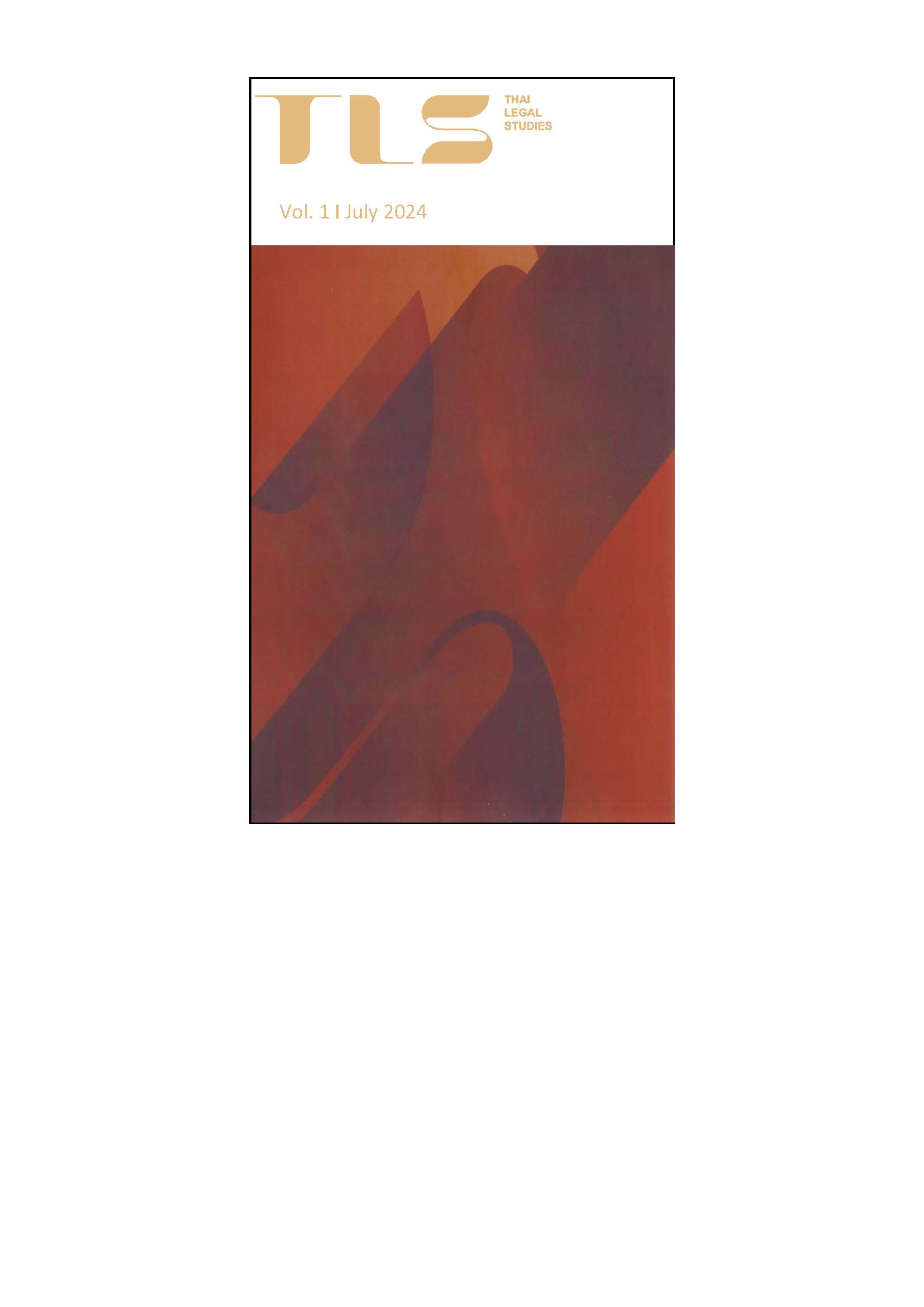Almost Happiness, But Not Quite: Reluctant Rule by Law and Thai Legal History in Seni Pramoj’s Legal Autobiography
DOI:
https://doi.org/10.54157/tls.271502Keywords:
Law and literature, Law and affect, Legal autobiography, Rule of law, Thai legal history, Reluctance, Ugly feelings, Semi-colonialismAbstract
This article engages with Thongchai Winichakul’s intellectual history of “Rule by Law” by using Greta Olson’s law and affect approach as a departure from the traditional field of law and literature, which focuses solely on discursive practices. It foregrounds the non-cathartic affect of reluctance, a less canonized emotion in Seni Pramoj’s autobiography as a meta-feeling that underpins all emotions such as pride, happiness, and shame in the meta-narrative of conservative Thai legal history. Introducing the concept of “Reluctant Rule by Law” and applying Sianne Ngai’s concept of ugly feelings, Lorianne York’s notion of reluctant celebrity, and postcolonial studies as a main framework, this article argues that Seni’s Janus-faced characteristic, navigating between Western legal modernity and Thai tradition, infused a reluctant tone into his historical works. This autobiographical reluctance reveals how the conservative Thai jurist upheld royalist nationalism while addressing semi-colonial ambiguities, perpetuating a semi-colonial reluctance that shapes the meta-narrative of conservative Thai legal history and constitutionalism based on royalist nationalism.
References
Ahmed, Sara. “Affective Economies.” (2004) 22(2) Social Text. https://doi.org/10.1215/01642472-22-2_79-117
———. “1 Happy Objects.” The Affect Theory Reader (Duke University Press 2010). https://www.degruyter.com/document/doi/10.1515/9780822393047-003/html
———. The Promise of Happiness (Duke University Press 2010). https://doi.org/10.1215/9780822392781
———. “Shame Before Others.” The Cultural Politics of Emotion (NED-New edition, 2, Edinburgh University Press 2014). http://www.jstor.org/stable/10.3366/j.ctt1g09x4q.10
Aristotle. Poetics (Project Gutenberg 2008). https://www.gutenberg.org/files/1974/1974-h/1974-h.htm#link2H_4_0002
Baldick, Chris. The Oxford Dictionary of Literary Terms (3rd edn, Oxford University Press 2008).
Berlant, Lauren. The Female Complaint: The Unfinished Business of Sentimentality in American Culture (Duke University Press 2008).
https://doi.org/10.1215/9780822389163
Bhabha, Homi. “Of Mimicry and Man: The Ambivalence of Colonial Discourse” (1984).
Chutima Pragatwutisarn. “The Promise of Happiness: Political Imagination in Contemporary Thai Society.” (2021) 16 Philosophia OSAKA. https://doi.org/10.18910/78340
Glaser, Henning. “Permutations of the Basic Structure: Thai Constitutionalism and the Democratic Regime with the King as Head.” In Andrew Harding and Munin Pongsapan (eds), Thai Legal History: From Traditional to Modern Law (Cambridge University Press 2021). https://doi.org/10.1017/9781108914369.017
Haberkorn, Tyrell. “The Hidden Transcript of Amnesty: The 6 October 1976 Massacre and Coup in Thailand.” (2015) 47(1) Critical Asian Studies 44–68. http://www.tandfonline.com/doi/abs/10.1080/14672715.2015.997344
Jackson, Peter. “Autonomy and Subordination in Thai History: The Case for Semicolonial Analysis.” (2007) 8(3) Inter-Asia Cultural Studies. https://doi.org/10.1080/14649370701393709
Khemthong Tonsakulrungruang. “The Revival of Buddhist Nationalism in Thailand and Its Adverse Impact on Religious Freedom.” (2021) 8 Asian Journal of Law and Society. https://doi.org/10.1017/als.2020.48
———. “Toward a New Buddhist Constitutionalism: Law and Religion in the Kingdom of Thailand.” (University of Bristol 2020).
Lysa, Hong. “Invisible Semicolony: The Postcolonial Condition and Royal National History in Thailand.” (2008) 11 Postcolonial Studies 315–27. https://doi.org/10.1080/13688790802226710
Mead, Kullada Kesboonchoo. “The Cold War and Thai Democratization.” In Albert Lau (ed), Southeast Asia and the Cold War (Routledge 2012).
Mérieau, Eugénie. “Buddhist Constitutionalism in Thailand: When Rājadhammā Supersedes the Constitution.” (2018) 13 Asian Journal of Comparative Law. https://doi.org/10.1017/asjcl.2018.16
Miall, David S. “Reader-Response Theory.” In David H. Richter (ed), A Companion to Literary Theory (John Wiley & Sons Ltd 2018). https://doi.org/10.1002/9781118958933.ch9
Natdanai Nachan. “The Constitutions of the Kingdom of Thailand: Elite-Constructed Constitutions (1932–1974).” (Te Herenga Waka–Victoria University of Wellington 2023). https://doi.org/10.26686/wgtn.24625464
Olson, Greta. “The Turn to Passion: Has Law and Literature Become Law and Affect?” (2016) 28(3) Law & Literature 335–353. https://doi.org/10.1080/1535685X.2016.1232925
Ngai, Sianne. Ugly Feelings (Harvard University Press 2007).
Nobchulee Maleenon., “ ‘No God-Damned Thailander Can Be Trusted to Do a Job Without Getting Political Minded’: The Free Thai Movement and the Politics of Independence During World War II.” (2018) 2(1) Voces Novae 12.
Pandit Chanrochanakit. “Deformed Constitutionalism: Thai-Style Judicialization and the Problem of Parliamentary Supremacy.” (2021) 12 Political Science and Public Administration Journal 1. https://so05.tci-thaijo.org/index.php/polscicmujournal/article/view/250458
Paweenwat Thongprasop, and Papawin Pechnil. “When Queer Emotions Meet the Constitutional Promise: Dystopian Constitutionalism in Thai Popular Culture.” (2022) 2(2) Thai Legal Studies 251.
https://doi.org/10.54157/tls.261281
Pike, Burton. “Time in Autobiography.” (1976) 28(4) Comparative Literature. https://doi.org/10.2307/1770020
Prajak Kongkirati. Thailand: Contestation, Polarization, and Democratic Regression (Cambridge University Press 2024. https://doi.org/10.1017/9781108565677
Singh, Prabhakar. “Of International Law, Semi-Colonial Thailand, and Imperial Ghosts.” (2019) 9 Asian Journal of International Law 46. https://doi.org/10.1017/S204425131800005X
Siravich Teevakul. “Constitutional Court Decision No. 19/2564: A Threat to Democracy? Forfeiture of Fundamental Rights and the Judicialization of Politics by the Thai Constitutional Court in 2021.” (2022) 2(2) Thai Legal Studies 178. https://doi.org/10.54157/tls.261266
Smith, Sidonie, and Julia Watson. “The Afterlives of Those Who Write Themselves: Rethinking Autobiographical Archives.” (2020) IX European Journal of Life Writing. https://doi.org/10.21827/ejlw.9.37323
———. Reading Autobiography: A Guide for Interpreting Life Narratives (University of Minnesota Press 2001). https://doi.org/10.5749/minnesota/9780816669851.001.0001
Thak Chaloemtiarana. “Thailand: The Politics of Despotic Paternalism.” (SEAP Publications 2007).
https://doi.org/10.7591/9781501721106
Thongchai Winichakul. “Modern Historiography in Southeast Asia: The Case of Thailand’s Royal Nationalist History.” In Prasenjit Duara, Viren Murthy, and Andrew Sartori (eds), A Companion to Global Historical Thought (Blackwell 2014). https://doi.org/10.1002/9781118525395.ch17
———. Moments of Silence: The Unforgetting of the October 6, 1976, Massacre in Bangkok (University of Hawaii Press 2020). https://doi.org/10.1515/9780824882853
———. Siam Mapped: A History of the Geo-body of a Nation (University of Hawaii Press 1997).
https://doi.org/10.1515/9780824841294
York, Lorraine. Reluctant Celebrity: Affect and Privilege in Contemporary Stardom (1st edn, Springer International Publishing 2018). https://doi.org/10.1007/978-3-319-71174-4_1
Sources in Thai
Kasidit Ananthanathorn. “The Life of Thai Constitutional Regime (1932–1947)” (Thammasat University 2017) (in Thai). https://digital.library.tu.ac.th/tu_dc/frontend/Info/item/dc:139852
Kitpatchara Somanawat. “Rule by Law in Context of Thai Legal History” (2020) CMU Journal of Law and Social Sciences 13 (in Thai).
ธงชัย วินิจจะกูล. “นิติรัฐอภิสิทธิ์และราชนิติธรรม: ประวัติศาสตร์ภูมิปัญญาของ Rule by law แบบไทย.” นิตยสาร WAY (2563) [Thongchai Winichakul. “Legal Privileged State and Royalist Rule of Law: Intellectual History of Thai-Style Rule by Law.” WAY Magazine (2020)].
ประชุมปาฐกถา และคำอภิปราย พ.ศ. 2489–2509. [Collective of Lectures and Debates 1946–1966.] http://eresource.car.chula.ac.th/chula-ebooks/detail.php
ปรีดี พนมยงค์. “ความไม่ชอบธรรมของรัฐธรรมนูญฉะบับชั่วคราว (รัฐธรรมนูญใต้ตุ่ม).” (สถาบันปรีดี พนมยงค์ 2564) [Pridi Banomyong. “The Illegitimacy of the Interim Constitution (Hidden-under-a-Water-Jar Constitution).” (Pridi Banomyong Institute 2021)]. https://pridi.or.th/th/content/2021/02/595
พรรคประชาธิปัตย์. “Democrat Party, Thailand.” Facebook (14 October 2014). https://m.facebook.com/DemocratPartyTH/photos/10152331438701791
ม.ร.ว. เสนีย์ ปราโมช. “กฎหมายสมัยอยุธยา” (วิญญูชน 2559) [MR Seni Pramoj. “Law in the Ayutthaya Period.”] (Winyuchon 2016).
———. ชีวลิขิต (วิญญูชน 2561) [MR Seni Pramoj. Life’s Destiny] (Winyuchon 2018).
วรวุฒิ บุตรมาตร. “รัฐธรรมนูญ ๒๔๙๐ รัฐธรรมนูญฉบับคณะเจ้า” (ศิลปวัฒนธรรม 2565) 44(1) [Worawut Butramat. “The 1947 Constitution: The Royal Constitution.”] (Silapawatthanatham 2021) 44(1).
สมชาย ปรีชาศิลปกุล. “รัฐธรรมนูญคณะราษฎรในประวัติศาสตร์ (กฎหมาย) กษัตริย์นิยม” The 101 World (24 มิถุนายน 2563) [Somchai Preechasilpakul. “Khana Ratsadon: Constitutions in the History of Royalist Law.”] The 101 World (24 June 2020). https://www.the101.world/khana-ratsadon-constitutions-in-the-history-of-royalist-law/
อรรถจักร์ สัตยานุรักษ์. ความเปลี่ยนแปลงความคิด/ความรู้สึกเรื่อง "ความซื่อสัตย์" ในสังคมไทย. ภายใต้แผนงานยุทธศาสตร์เป้าหมาย (Spearhead) ด้านสังคม แผนงานคนไทย 4.0, สนับสนุนโดย สำนักงานการวิจัยแห่งชาติ (วช.) [Attachak Sattayanurak. The Change of Thoughts/Emotion about "Integrity" in Thai Society. Spearhead Strategic Plan for Thai Society 4.0, Supported by the National Research Council of Thailand (NRCT)]. https://www.khonthai4-0.net/content_detail.php?id=315
อาทิตย์ เจียมรัตตัญญู "นักเรียนฟิลิปปินส์" ในทัศนะวิจารณ์ของชนชั้นนำไทยต่อนักเรียนนอกก่อนสงครามมหาเอเชียบูรพา, (2015) 4(7) ชุมทางอินโดจีน เอเชียตะวันออกเฉียงใต้ปริทรรศน์ 559–74 [Arthit Jiamrattanyoo. “ ‘Philippine-Educated Students’ in the Critical Perception of the Thai Elite Before the Asia-Pacific War.” (2015) 4(7) Indo-China Crossroad: Southeast Asian Review 559–74].
Published
Issue
Section
License
Copyright (c) 2024 Paweenwat Thongprasop

This work is licensed under a Creative Commons Attribution 4.0 International License.
Authors retain copyright and publishing rights without restrictions, but grant Thai Legal Studies the right of first publication in English and to distribute the work under a Creative Commons Attribution 4.0 International Public License (“CC BY 4.0”). It allows others to freely share the work, including the making of translations. There is no charge or fee for readers to immediately view published articles or content, and users are allowed to read, download, copy, distribute, print, search, link to the full texts of the articles, or use them for any other lawful purpose, without asking prior permission from Thai Legal Studies or the author(s), the only requirement being that an acknowledgement is given of the work’s authorship and its initial publication in English by Thai Legal Studies.







